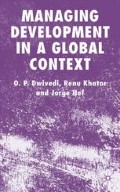Abstract
The internationalization of the theory and practice of public administration is a phenomenon closely related to the creation and evolution of the modern world system. Its roots are found in the European colonial expansion into the New World and subsequently Asia and Africa. The overseas empires and administrative systems that evolved there corresponded to particular modalities of accumulation in different historical periods. In the earlier cases of seventeenth-century Spain and Portugal, the mold was mercantile, while in the cases of British, French, Dutch, or Belgian expansion in the eighteenth and nineteenth centuries, modern capitalism prevailed.
Access this chapter
Tax calculation will be finalised at checkout
Purchases are for personal use only
Preview
Unable to display preview. Download preview PDF.
References
Astley, W. Graham and Andrew Van de Ven (1983) “Central Perspectives and Debates in Organization Theory,” Administrative Science Quarterly, 28, pp. 245–73.
Balogun, M. Jide and Gelase Mutahaba (1999) “Redynamizing the African Civil Service for the Twent-first Century,” in Bureaucracy and the Alternatives in World Perspective, Londom: Macmillan, pp. 190–216.
Barber, William and Ronning Neale (1966) Internal Security and Military Power: Counterinsurgency and Civic Action in Latin America. Columbus: Ohio State University Press, pp. 217–45.
Caiden, Gerald E. and O. P. Dwivedi (2001) “Official Ethics and Corruption,” in Gerald E. Caiden, O. P. Dwivedi and Joseph G. Jabbra (eds), Where Corruption Lives. Bloomfield, Conn., USA: Kumarian Press, pp. 244–55.
Caiden, Gerald E., O. P. Dwivedi and Joseph G. Jabbra (eds) (2001) Where Corruption Lives. Bloomfield, Conn., USA: Kumarian Press.
Dwivedi, O. P. (1987) “Moral Dimensions of Statecraft: a Plea for an Administrative Theology,” Canadian Journal of Political Science, 20, 4, pp. 699–709.
Dwivedi, O. P. (1994) Development Administration: From Underdevelopment to Sustainable Development. London, Macmillan.
Dwivedi, O. P. and James Iain Gow (1999) From Bureaucracy to Public Management: the Administrative Culture of the Government of Canada. Peterborough, Canada: Broadview Press.
Gil, Barry, Rocamora Joel, and Wilson, Richard (1993) Low Intensity Democracy: Political Power in the New World Order. London: Pluto Press.
Lee, Rensselaer W. (1988) “Dimensions of the South American Cocaine Industry,” Journal of Interamerican Studies, 30, 3, pp. 87–104.
Macpherson, Crawford Brough (1977) The Life and Times of Liberal Democracy. Oxford: Oxford University Press.
Malloy, James (1977) “Authoritarianism and Corporatism in Latin America: the Modal Pattern,” in James Malloy (ed.), Authoritarianism and Corporatism in Latin America. Pittsburgh: Pittsburgh University Press, pp. 3–19.
Manzer, R. (1984) “Policy Rationality and Policy Analysis: the Problem of the Choice of Criteria for Decisoion-making,” in O. P. Dwivedi (ed.), Policy and Administrative Studies. Guelph, Canada: University of Guelph, pp. 27–40.
Mills, C. W. (1957) The Power Elite. New York: Oxford University Press.
Nef, Jorge (1982) “Empate politico, inmobilismo e inflacion: Algunas notas preliminares,” Revista Centroamericana de Administration PGblica, 2, 3 (July–December), pp. 141–55.
Nef, Jorge (1997) “Estado, poder y politicas sociales: una vision critica,” in Raril Urzûa (ed.) Cambios sociales y politica ptblicas en América Latina. Santiago: Andros, pp. 233–62.
Nef, J. and Dwivedi, O. P. (1981) “Development Theory and Administration: a Fence Around an Empty Lot?,” The Indian Journal of Public Administration, 28, 1 (January–March), pp. 42–66.
Nef, J. and Robles, W. (2000) “Globalization, Neoliberalism and the State of Underdevelopment in the New Periphery” (with Wilder Robles), Journal of Developing Societies, 16, 1 (Leiden: Brill), pp. 27–48.
Osborne, David and Gaebler, Ted (1992) Reinventing Government: How the Entrepreneurial Spirit is Transforming the Public Sector. Reading, Mass.: Addison-Wesley Publishers.
Robin, Theobald (1995) “Globalization and the Resurgence of the Patrimonial State,” International Review of Administrative Sciences, 61, 3 (September) pp. 423–32.
Robles, Wilder (2000) “Beyond the Politics of Protest: the Landless Rural Workers Movement of Brazil,” Canadian Journal of Development Studies, 21, 3, pp. 657–91.
Rohr, John A. (1988) “Bureaucratic Morality in the United States,” International Political Science Review, 9, 3, pp. 167–78.
Turner, M. and Halligan, J. (1999) “Bureaucracy and the Alternatives in East and Southeast Asia,” in Keith M. Henderson and O. P. Dwivedi (eds), Bureaucracy and the Alternatives in World Perspective. Basingstoke: Macmillan, pp. 129–59.
UNDP (1998) Good Governance and Sustainable Human Development. New York: UNDP (UNDP/Docs/UN98–1.PDF).
Vilas, Carlos (1995) “Economic Restructuring, Neoliberal Reforms and the Working Class in Latin America,” in S. Halebsky and R. Harris (eds), Capital, Power and Inequality in Latin America. Boulder, CO: Westview Press.
Vilas, Carlos (2000) “¿Máps allá del Consenso de Washington? Un enfoque desde la política de algunas propuestas del Banco Mundial sobre reforma administrativa,” Revista del CLAD. Reforma y Democracia, 18 (October), pp. 25–76.
World Bank (1997) World Development Report 1997. Washington, DC: World Bank.
Author information
Authors and Affiliations
Copyright information
© 2007 O.P. Dwivedi, R. Khator, J. Nef
About this chapter
Cite this chapter
Dwivedi, O.P., Khator, R., Nef, J. (2007). The Transition from Development Administration to New Public Management: an Interpretative Exploration. In: Managing Development in a Global Context. Palgrave Macmillan, London. https://doi.org/10.1057/9780230627390_7
Download citation
DOI: https://doi.org/10.1057/9780230627390_7
Publisher Name: Palgrave Macmillan, London
Print ISBN: 978-1-349-27947-0
Online ISBN: 978-0-230-62739-0
eBook Packages: Palgrave Political & Intern. Studies CollectionPolitical Science and International Studies (R0)

